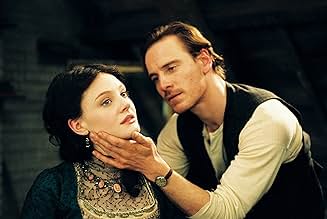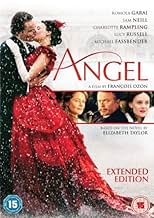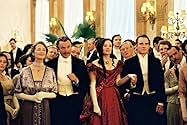IMDb RATING
5.8/10
5.8K
YOUR RATING
The rise and fall of a young eccentric British writer, in the early 20th century.The rise and fall of a young eccentric British writer, in the early 20th century.The rise and fall of a young eccentric British writer, in the early 20th century.
- Awards
- 1 win & 3 nominations total
Geoffrey Streatfeild
- Sebastian
- (as Geoffrey Streatfield)
Featured reviews
I'm a great admirer of Francois Ozon's French movies (Swimming Pool, Under the Sand, 8 Women) but this, his first foray into English language drama, is a stinker. Adapted from a book by Elizabeth Taylor about an Edwardian novelist whose life fails to live up to her romantic fantasies it is as ridiculous, clichéd and overwritten as any of the heroine's creations; hard to know if this is the fault of the source material or Ozon's adaptation (though he has been assisted by acclaimed playwright and translator Martin Crimp). You watch it in disbelief, unsure if you're meant to laugh or not, faintly hoping that this is a deliberate attempt at post-modern ironic detachment (but wondering what would be the point) and gradually realising that Ozon thinks he is Douglas Sirk and has completely embarrassed himself.
The actors look all at sea, particularly Romola Garai who can't give any charm to the unlikeable heroine, and Ozon adopts a stiff and old-fashioned style of film-making - complete with syrupy music and terrible back projections - which make the film look as it it was made in 1936 rather than 2006; I'd like to think this was a deliberate if unfortunate miscalculation but the consequence is that the finished product looks stilted and amateurish. Only Charlotte Rampling - Ozon's muse - almost saves the day, but her air of sardonic detachment probably says more about her feelings towards the film than about her character.
The actors look all at sea, particularly Romola Garai who can't give any charm to the unlikeable heroine, and Ozon adopts a stiff and old-fashioned style of film-making - complete with syrupy music and terrible back projections - which make the film look as it it was made in 1936 rather than 2006; I'd like to think this was a deliberate if unfortunate miscalculation but the consequence is that the finished product looks stilted and amateurish. Only Charlotte Rampling - Ozon's muse - almost saves the day, but her air of sardonic detachment probably says more about her feelings towards the film than about her character.
If I had approached this movie as a satire, perhaps it would have been more bearable. Or maybe not. It somewhat feels like a play on 40's-50's movie comedy, but set in the early 1900's. The script (and the acting for that matter) is so flawed, there is no need to even bother going over its flaws. Fassbender clearly lives in the 21st century and Romola is straight out of an overacted tragicomedy play from the 1800's, except she is behaving like a bratty teenager we see on Sweet 16. I hope she was doing it on purpose, otherwise there are no excuses for her annoyance. There is a fine line between funny and annoying. I had to force myself to finish watching this movie just because I am such a huge Fassbender fan. Him, along with Charlotte and Sam, what a waste of talent.
Angel Deverell (Romola Garai) imagines herself to be a writer. Night after night she writes of her imaginative world. At school, she is ridiculed for her fantasies, and her mother (Jacqueline Tong) has no idea of her talent. A London publisher Theo (Sam Neill), publishes her first book despite her arrogance and his reservations. The novel is a bestseller. She writes another and another and another, and so on.
At the height of her fame, she meets the painter Esmé (Michael Fassbender), and is immediately stuck, even if he is even more arrogant that she is. And, sad to say, more untalented.
This is the key to this film. It is a satire of those stories of the period. There are only two serious people in the film. The rest are caricatures of popular characters and settings.
British writer Elizabeth Taylor's novel, based upon Marie Corelli, a long-forgotten English novelist of the 19th Century, was translated to the screen by François Ozon (Swimming Pool, 8 Women), who also directed. He certainly captured the ego Corelli was reputed to have.
The life she lived or the life she dreamed? That is the question of this film. There is no doubt that for a few brief moments, Angel was never in touch with reality. It makes for great satire.
At the height of her fame, she meets the painter Esmé (Michael Fassbender), and is immediately stuck, even if he is even more arrogant that she is. And, sad to say, more untalented.
This is the key to this film. It is a satire of those stories of the period. There are only two serious people in the film. The rest are caricatures of popular characters and settings.
British writer Elizabeth Taylor's novel, based upon Marie Corelli, a long-forgotten English novelist of the 19th Century, was translated to the screen by François Ozon (Swimming Pool, 8 Women), who also directed. He certainly captured the ego Corelli was reputed to have.
The life she lived or the life she dreamed? That is the question of this film. There is no doubt that for a few brief moments, Angel was never in touch with reality. It makes for great satire.
I've added Angel in my watch list about a month ago, after studying -quite a few- of Romola Garai's and Michael Fassbender's performances. Some of the films i've watched with Garai were: Inside I'm Dancing (2004), Mary Bryant (2005), Atonement (2007) and The Other Man (2008). She was brilliant in all of them. So she was in this film.
This is a fiction story based on a novel/screenplay by Elizabeth Taylor. It's kind of a biography of a young writer (Angel) with a not wealthy background that manages to finally publish her rich -in imagination- novels. What do you think, passionate love wouldn't knock on her door when she starts being famous? This is where Fassbender's role (Esme) comes in. Another artist, an underestimated painter who doesn't feel confident enough about his work and who also keeps some skeletons in his closet that will -later in the film- (much later) finally be revealed. Fassbender is a great performer but he doesn't get to shine here. Sam Neil plays the part of the overwhelmed publisher and Lucy Russell does a great supporting work as Esme's sister.
As i'm still new in screen writing and film structure, i found myself a bit worried about the way this movie was unfolded. Everything seemed so magical and dreamy and the drama was almost out of the plot for much longer than i expected. It had to make a turn! And it did and it was sudden, maybe a bit frustrating at some point, but you'll have your turning point eventually.
Since i've realized that there where practically two acts in this film i recalled the atmosphere, the costumes, the music and the colors that went along with the change. In the beginning everything was so bright and cheerful, then all turned pale and gloomy to show the depression, which you can clearly notice even in the clothes of the protagonist. There where only a few outdoor special effects that looked really out of date and weird for a 2007 production. I laughed and quickly forgot about them.
In a nutshell, it was a decent film -with a small cast- describing the intense, disturbed and not very long life of a young female writer in the early 20s, but nothing more to get excited about.
This is a fiction story based on a novel/screenplay by Elizabeth Taylor. It's kind of a biography of a young writer (Angel) with a not wealthy background that manages to finally publish her rich -in imagination- novels. What do you think, passionate love wouldn't knock on her door when she starts being famous? This is where Fassbender's role (Esme) comes in. Another artist, an underestimated painter who doesn't feel confident enough about his work and who also keeps some skeletons in his closet that will -later in the film- (much later) finally be revealed. Fassbender is a great performer but he doesn't get to shine here. Sam Neil plays the part of the overwhelmed publisher and Lucy Russell does a great supporting work as Esme's sister.
As i'm still new in screen writing and film structure, i found myself a bit worried about the way this movie was unfolded. Everything seemed so magical and dreamy and the drama was almost out of the plot for much longer than i expected. It had to make a turn! And it did and it was sudden, maybe a bit frustrating at some point, but you'll have your turning point eventually.
Since i've realized that there where practically two acts in this film i recalled the atmosphere, the costumes, the music and the colors that went along with the change. In the beginning everything was so bright and cheerful, then all turned pale and gloomy to show the depression, which you can clearly notice even in the clothes of the protagonist. There where only a few outdoor special effects that looked really out of date and weird for a 2007 production. I laughed and quickly forgot about them.
In a nutshell, it was a decent film -with a small cast- describing the intense, disturbed and not very long life of a young female writer in the early 20s, but nothing more to get excited about.
Hmmmm... if the reviews and comments I've seen are any indication, melodrama is as divisive as ever. I found Ozon's approach admirable: intelligent and objective but not satirically distanced, like Fassbinder without the cruelty. It seems clear to me that he is showing us not a realistic depiction of Angel's life but a version colored by her imagination. The intention is not to mock her but to allow us to share her experience, and to make up our own minds about the value of her fantasies. The closest to an authorial statement comes from the character least sympathetic to Angel: Charlotte Rampling as the publisher's wife comments that in spite of Angel's lack of talent or self-knowledge, she has to admire her drive to succeed. Of course we're not compelled to agree, but it strikes me as a fair assessment.
The reactions to this movie remind me of the uncomprehending dismissal of Sofia Coppola's Marie Antoinette, another story of a shallow, self-involved woman that insists on looking through her eyes. This kind of scrupulous generosity is in line with a tradition going back to Flaubert's Madame Bovary, and both directors have the stylistic confidence to carry it off. It may just be that they don't have the critics they deserve.
The reactions to this movie remind me of the uncomprehending dismissal of Sofia Coppola's Marie Antoinette, another story of a shallow, self-involved woman that insists on looking through her eyes. This kind of scrupulous generosity is in line with a tradition going back to Flaubert's Madame Bovary, and both directors have the stylistic confidence to carry it off. It may just be that they don't have the critics they deserve.
Did you know
- TriviaThe story is inspired by the life of Marie Corelli.
- Quotes
Angel Deverell: [from trailer] Everyone told me my dreams were lies. All I wanted was to make it true.
- ConnectionsReferenced in The New Girlfriend (2014)
- How long is Angel?Powered by Alexa
Details
- Release date
- Countries of origin
- Official sites
- Language
- Also known as
- Paradise
- Filming locations
- Production companies
- See more company credits at IMDbPro
Box office
- Budget
- €14,900,000 (estimated)
- Gross worldwide
- $2,835,903
- Runtime
- 2h 14m(134 min)
- Color
- Sound mix
- Aspect ratio
- 1.85 : 1
Contribute to this page
Suggest an edit or add missing content




































